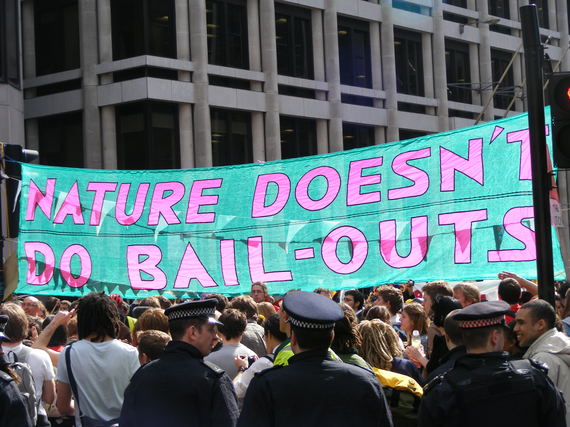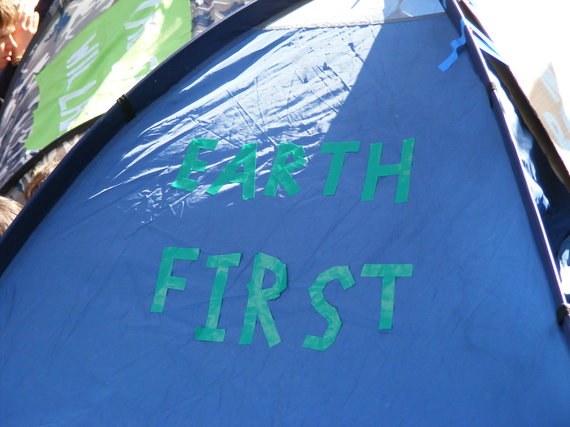How can we mobilize the masses around climate change? The case to act is now urgent. As you might know, 2014 was the hottest year in 130 years of systematic record keeping. Nine of the 10 hottest years on record have occurred since 2000. If this wasn't compelling enough, the symbolic Doomsday Clock moved to three minutes before midnight in January 2015 because of the gathering dangers of climate change and nuclear proliferation, signalling the gravest threat to humanity since the throes of the cold war.
Should we be alarmed? It is the closest the clock has come to midnight since 1984, when arms-control negotiations stalled and virtually all channels of communication between the US and the former Soviet Union closed down.
Whilst 'sustainability and climate'-related news is more commonplace in the developed nations and part of our mainstream media, even if it is lower down the news agenda, it's not the case for most of the rest of the world. The majority of the world's population is more worried about their pay packet at the end of the month and how to pay their bills rather than the end of the world (which seems a long way off unless you're living in Kiribati island -- one of the Pacific Island states that is one of the most vulnerable in the world due to the potential devastating effects of climate change that lay ahead.)
Global warming as well as nuclear proliferation seem to be such abstract notions for the average man or woman in the street, to the extent that they're unlikely to show any real concern unless it makes an immediate and direct impact on their day to day lives.
The enormity of these unforeseen possibilities is unfathomable within the general context of most people's lives, and it is therefore no surprise that most people become disenchanted and disenfranchised with this unknown realm of possibility. It is basically down to the fact that the problems seem so huge that no single individual feels that they can make a difference and therefore they cut the umbilical cord which connects them with the supposed prophetic events beholden in the future.
It seems many people in modern societies are still devoid of any significant emotional attachment to the advancement of extreme climate change as they live out their relatively straightforward lives living in their clean houses, streets, orderly neighborhoods and functioning cities. Renee Lertzman's research into Climate Change and inaction reported in The Ecologist (Lertzman 2008) alerts us to the role anxiety can play in an apparently apathetic response.
However, in the midst of all this climate doom and gloom, there are many great opportunities emerging. Although most people are experiencing extreme information overload in their daily lives and finding it difficult to process and manage, the advent of social media has allowed us to engage mass populations around climate change and disseminate the truth of our trajectory at lightning speed through online content sharing of news.
Most people I know have an almost inseparable relationship with their smart phone and an insatiable desire for content, new images and captivating videos to share. We have all turned into publishers, syndicating news to our respective social and professional networks at the press of a button. The whole world of viral marketing and word-of-mouth citizen engagement is racing ahead in leaps and bounds as the 'sharing' function becomes indispensable to people's daily lives, feeding our social whims and, for many validating our existence as social citizens. This is all good news for the world of campaigning and capacity building i.e. garnering support around popular issues and creating traction. There is now a burgeoning array of online social movements gaining ground and shifting attitudes including Avaaz.org , Change.org, Sumofus.org, the Global Call for Climate Action, 38degrees and the more recent Global Catholic Climate Movement which Ethical Team supported with their April Care4Creation campaign and its inaugural Parish Toolkits.
The breadth of these organizations and their global reach is a cause for celebration in the fast moving chaotic world we occupy which now seems to be in a continual state of disarray, conflict and boom and bust economic cycles.
There are also more sector specific campaigns emerging such as the new More than Scientists campaign which recently launched to provide a clarion call from the worlds scientific elite to stand up and be counted in the fight against climate change. And from Greenpeace we have the Save the Arctic campaign which seeks to protect one of the last untapped natural habitats from the ravages of oil exploration.
Some of these organisations have achieved massive leaps in their membership - a case in point is Avaaz, which now has about 42 million subscribers. This is significant by any publisher's standard and at this level Avaaz's donor activation campaigns should be able to sustain them organizationally simply through the sheer numbers who are able to give small, but regular donations, alongside traditional funding from foundations and HNWIs.
Another example of movement building and a sea change taking place within the world of politics is the emergence of the UK's Green Party which has now become the largest youth movement in the country. It's about time the Greens gained a foothold in the UK which no doubt spawned the impetus behind some of these new European online campaigning platforms. The green movement is in affect 'coming of age'. It's either now or never, and the future generation seem to be realizing their potential in that they have a voice through digital engagement as well as through more traditional activism. Like the Arab spring they need to embrace this social tide and embark on a crusade to ensure they have a future worth living for long after today's politicians are out of the frame.
So how do we stop the silent collapse? Why are we still facing an impeding gargantuan disaster similar to many of the apocalyptic science fiction movies we've all seen over the years if we are indeed such an 'intelligent' species? Why is sustainability such a hard sell? On the one hand we are facing catastrophic and impending climate crisis and yet on the other hand we have the powerful solutions that could allow us to reduce the impact humanity has on the environment, maintain our rich biodiversity and habitats for future generations. Isn't this just about basic stewardship? Is it that hard for our elected leaders to understand? Does it really make any sense polluting our water systems that are the essence of all life on earth or the air we need to breathe? I don't think so. And yet we're still seeing governments opting for short term measures such as fracking over cleaner energy solutions that are proven and ready to scale up.
Why is there so much skepticism and what's holding back the true green revolution or should we say revelation?
The tipping point will be creating and engaging these mass movements. There are also lots of large captive and in some cases untapped audiences that can be mobilized further and used to promote the climate agenda including in sport, religion, universities & colleges, unions and in popular culture with celebrities. Anywhere in fact where there are existing large organized groups that can be harnessed for a greater social good with clear channels of communications for cascading ideas and sharing best practice.
Let's hope that James Lovelock, independent scientist, environmentalist and futurist who pioneered the theory of Gaia isn't right. His comment on BBC Radio 4 recently said we should focus ALL our efforts on adaption as opposed to mitigation as it was just too late to make the changes necessary.
So the best advice is sign up to the global campaigning platforms that are now challenging global corporations and governments so that through mass online protest we can create a fairer, more equitable and more transparent society. And let's hope that these movements pool resources and join forces to stand behind one single unified message as we count down to the historic COP21 Climate change talks this December in Paris.
It really doesn't make any sense that according to a report released by Oxfam last year, the richest 85 people in the world, who could fit onto a single double-decker bus, have just as much wealth as the poorest half of the world. This shock finding from anti-poverty campaigners Oxfam came as world leaders, business chiefs and academics met in Davos for the World Economic Forum in 2014.
So start your journey as an armchair activist today and start petitioning and joining these climate change campaigning organizations as there's just no excuse not to engage in 2015.
__________________
Iain Patton is a Stakeholder Engagement consultant amplifying the sustainability agenda. He does this by building partnerships, advocacy, outreach, capacity building, stakeholder engagement and challenging business to embed sustainability at its heart. Iain helps organisations pursue large-scale social change efforts, which is the challenge and opportunity of our time. He support initiatives that help create sustainable movements of citizens mobilised to take direct action. See www.ethicalteam.com



